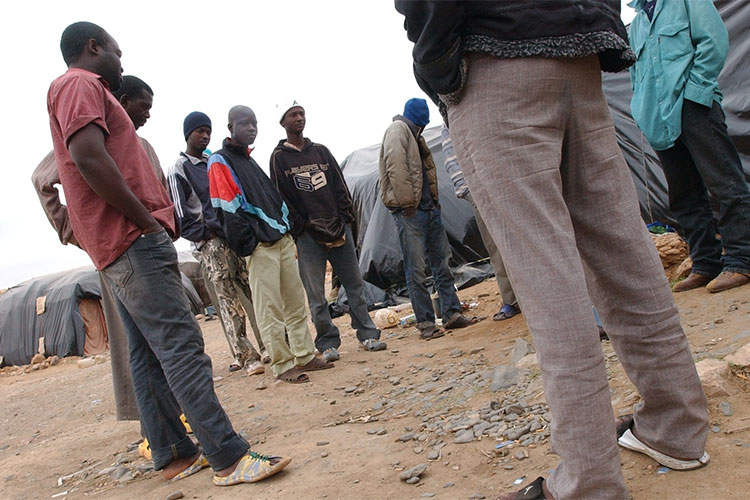Morocco, EU Accused of Dumping African Migrants in Sahara

An international investigation carried out by a consortium of journalism and made up of major international newspapers, similar to the one that sparked the “Pegasus” scandal, excluded Algeria from abusing illegal African immigrants while accusing North African countries, led by Morocco, and the European Union, of involvement in human rights violations.
The one-year wide-ranging investigation by Lighthouse Reports with international media outlets such as the Washington Post, Der Spiegel, the German newspaper ARD, the Spanish newspaper El País, the French newspaper Le Monde and other newspapers, revealed that the European Union was deliberately financing these crimes. In some cases, it directly participates in the detention and systematic expulsion of migrants from black communities in at least three countries in North Africa, namely Morocco, Tunisia, and Mauritania. In secret operations it dumps tens of thousands of African migrants in the Sahara or remote areas every year, to prevent them from coming to the European Union.
According to the report, such operations were run thanks to money, vehicles, equipment, intelligence and security forces provided by the EU and European countries, which means that they were run in the Sahara and paid under the guise of “migration management,” despite the European Union’s claim that the funds do not support human rights violations against sub-Saharan African and North African communities. Brussels publicly claims it closely monitors how this money is spent, but the reality is very different.
The investigation’s findings show that in Morocco, Mauritania and Tunisia, refugees and migrant workers, some of whom were on their way to Europe, as well as people with legal status and established livelihoods in these countries, are being arrested based on the colour of their skin, and are being transferred on board of buses and taken to unknown locations, often barren desert areas, they are left without any help, water or food, leaving them at risk of kidnapping, extortion, torture, sexual violence and, in the worst cases, death. Others are transported to border areas, where the authorities are said to sell them to traffickers of human beings and gangs who torture them for ransom.”
The report said that it is “the most comprehensive attempt to date to document European knowledge of and involvement in racially motivated anti-immigrant operations in North Africa.” It reveals how “this system of mass displacement and abuse has not only been known in Brussels for years but is run thanks to the money, vehicles, equipment, intelligence and security forces provided by the European Union and European countries.”
Journalists interviewed more than 50 survivors of these evictions in Morocco, Mauritania and Tunisia – all of whom were from sub-Saharan or West African countries – which helped to identify the systematic, racially motivated nature of these practices, and some survivors also provided visual material and data about their tough journey. Their testimony, including videos and photos, “helped us to recognise the systematic and racially motivated nature of the practices,” along with the consortium’s evidence gathering, the report confirmed.
In addition to visual evidence provided by the survivors, investigators used open-source methods to find videos posted on social media and sought to geolocate and verify these cases. In Morocco, for example, investigators say: “We followed paramilitary forces of the Auxiliary Forces and filmed them picking up black people from the streets three times over three days in the capital, Rabat. We also filmed people being detained in local government buildings before loading them onto unmarked buses to transport them to remote areas”.
By speaking with current and former EU staff and sources within national police forces and international organizations which have a presence in countries where African migrants are brutally deported, “we documented that the EU is well aware of these operations and is sometimes directly involved in them,” the report added.
Although European officials expressed concern about the escalation of operations in the region against migrants from sub-Saharan Africa, according to the investigation, they consistently denied the use of funds to violate basic human rights. However, two senior European Union sources said that it was “impossible” to provide a full explanation of how the EU funds were being used to violate migrants’ rights.
The authors of the investigation quoted one of the consultants who worked on projects financed by the European Union Emergency Trust Fund for Africa, under which the European Union granted Morocco and other Maghreb countries more than 400 million euros to manage migration in recent years, about the objectives of the fund, which were summarized as follows: “You have to make immigrants lives difficult and complicated. If you do it with a migrant from Guinea in (for example, Morocco) twice, the third time he will ask you to take him voluntarily to his homeland.”
Investigators were able to obtain several official documents, the report says, including one from the European Union border agency Frontex earlier this year “stating that Morocco racially discriminates (Africans) and forcibly transfers black migrants.” It also discovered hard-to-find publicly available documents that show that EU officials have been holding internal discussions about some of the abusive practices since at least 2019. They also revealed that the EU is directly funding Moroccan paramilitary forces, which were filmed assembling black people in the capital (Rabat).
The investigators also documented, according to the report, “the vehicles used during the arrest and expulsion operations along with vehicles provided by European countries by identifying tenders and conducting visual analyses, which placed the European Union in the crosshairs of criticism.

